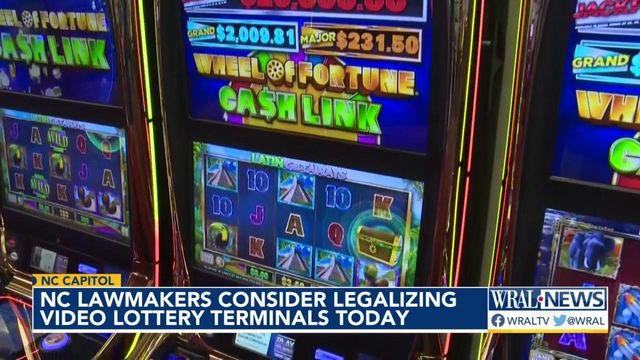NC lawmaker pitches legal video gaming as solution to sweepstakes problem
North Carolina should legalize and tightly regulate video gaming terminals in bars, restaurants and other locations that sell beer and alcohol to help eradicate the state of illegal machines and so-called sweepstakes parlors and net more than $1 billion in income, a House lawmakers told colleagues Tuesday.
Rep. Harry Warren, a Rowan County Republican, pitched House Bill 512 as a way to clean up illegal gambling, fund cost-free community college and increase appropriations to historically Black colleges and universities (HBCUs) in the state.
"For more than a decade the General Assembly has been trying to close down what we now refer to as sweepstakes parlors across the state and various reasons can be given as to why those efforts have been unsuccessful," Warren told the House Commerce Committee, which held a discussion-only meeting on the bill.
"The real reason that these things flourish is because people play them. If there were no money in it, they would not be in business. We're a free market economy, we're based on supply and demand, and people are demanding it. But by restricting, regulating and reducing the supply, we can eliminate sweepstakes parlors and the seedy aspects of unregulated gambling, replacing it with a limited supply of gaming entertainment."
Video gaming terminals, sometimes called video lottery terminals or video poker terminals, have been illegal in the state since 2007. Several lawsuits have challenged the bans.
Warren told members that there are an estimated 60,000 to 100,000 machines in operation across the state. He said his bill would eliminate any ambiguity about whether a machine is legal or illegal. A terminal would need to be certified by the state in order to be legal, and any machine without a certification sticker would be illegal.
The bill would allow terminals in businesses with an ABC on-site or off-site permit. No business could operate solely to have video machines.
The legislature's Fiscal Research Division estimates that 20,000 legal machines would be in operation by 2027-28 under the law. Warren said that number could be 35,000, but still represent a deep cut from the total illegal machines now in operation.
But opponents argue that the bill will not cut down on illegal operators and instead will give the state's sanction to a predatory industry.
"This money is money that will come directly out of the pockets of North Carolina citizens," said John Ruston, president of the North Carolina Family Policy Council. "Video gambling is known as the crack cocaine of gambling because it is so addictive. These machines and games are professionally designed to keep people playing as long as possible."
No vote was taken in the committee. Warren said he plans to bring it back to the panel for a vote. The committee approved a similar bill during last session, but it did not move any further.
Committee members, even those who have opposed gambling expansion in the past, expressed interest in Warren's bill. Rep. Jay Adams, a Catawba County Democrat and opponent of other gambling measures, said he would work with Warren on the bill to limit illegal machines, which he called "severely problematic" and "insidious."
In February, law enforcement in Charlotte busted two establishments for illegal gaming.
"Illegal video gambling is prevalent in every part of our great state," said Patrick Ballentine, a former lawmaker and current lobbyist. "The illegal nature of this activity brings with it a lot of violent crime, not just in gambling halls but in strip malls and service stations and country stores. Free-market capitalism suggests that the best way to rid this state of illegal video gambling is to create a legal regulated system that brings transparency and sunlight to the dark, shadowy underground economy."
Supporters have used similar arguments in their effort to legalize mobile sports betting in North Carolina. The Sports Wagering Act (House Bill 347) passed the House in late March and will be discussed in the Senate Commerce Committee on Wednesday at noon.
Warren's legislation proposes to use the revenue generated to support forgivable loans for community college students. The students would have to complete their studies within six years or the loan would have to be repaid.
The bill also includes millions for in-state HBCUs, both public and private. And it would give $1 million to county sheriff's departments to combat illegal gaming.
The North Carolina Education Lottery would be in charge of regulating the industry.
"Is it proper for the government to enact a policy that can make its citizens losers and financial slaves?," said Rev. Mark Creech, the executive director of The Christian Action League. "The Christian Action League urges you not to vote for what amounts to nothing more a sunk cost fallacy. Is it right for us not to admit our past errors and further fleece the people of North Carolina."










